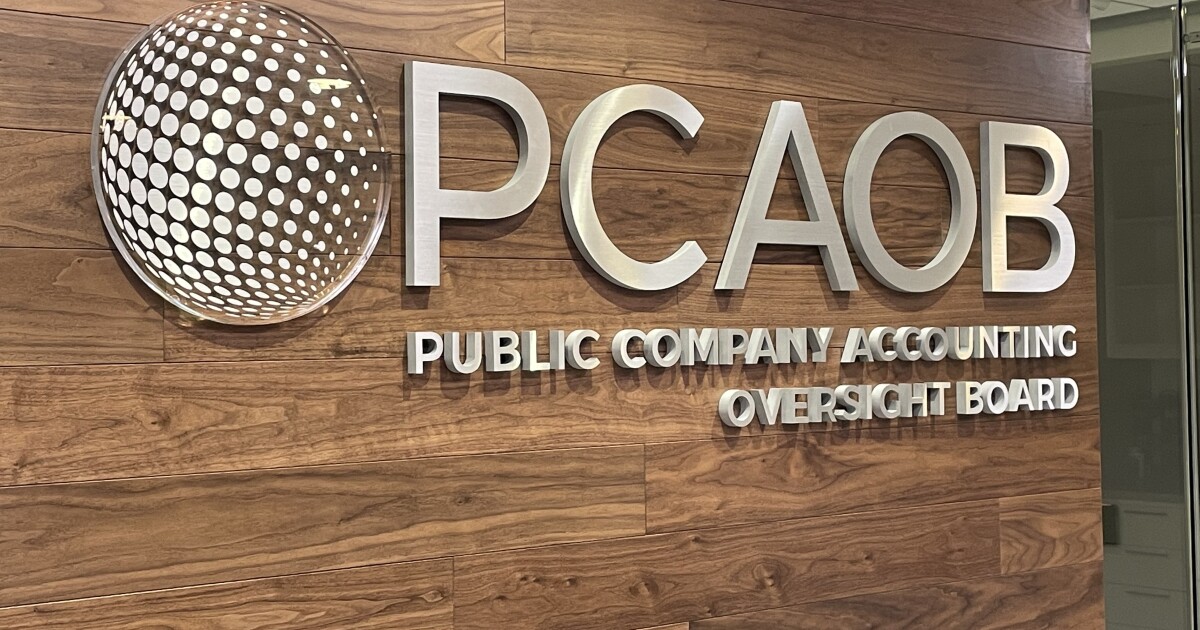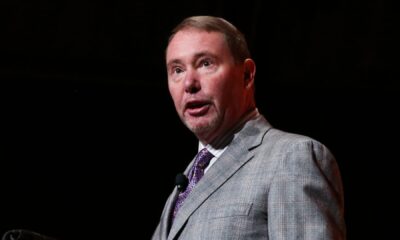Accounting
PCAOB proposes far-reaching requirements for audit firm reporting
Published
1 year agoon

The Public Company Accounting Oversight Board voted to propose an extensive set of new reporting requirements to impose on auditing firms during a meeting Tuesday, even as the auditing overseer is facing
The new requirements come in the form of two related proposals, one on firm and engagement metrics and the other on firm reporting. The
They include information about firms’ overall audit practice, such as how partners’ quality performance ratings affect their compensation, and information about individual engagements, for example the time incurred by partners and managers on the engagement team related to areas of significant risks, critical accounting policies and practices, and critical accounting estimates.

“Collectively, these metrics would help investors make more informed decisions about how they invest their money, and they would provide audit committees with consistent data to analyze and compare as they are selecting and monitoring audit firms, ” said the PCAOB chair, Erica Williams, in a statement during Tuesday’s open meeting. “Firms could use these standardized metrics about themselves and their peers to assist in designing, implementing, monitoring and remediating their systems of quality control.”
She acknowledged that the PCAOB could also benefit from having such information on hand in a consistent, comparable format for use in its inspections program and standard-setting initiatives.
The proposal, if adopted, would require PCAOB-registered firms that audit one or more accelerated filers or large accelerated filers to publicly report specified metrics relating to such audits and their audit practice.
The proposal envisions standardized firm- and engagement-level metrics to create a data set for investors and other stakeholders for analysis and comparison. The proposed metrics cover:
- Partner and manager involvement;
- Workload;
- Audit resources;
- Experience of audit personnel;
- Industry experience of audit personnel;
- Retention and tenure;
- Audit hours and risk areas (engagement-level only);
- Allocation of audit hours;
- Quality performance ratings and compensation (firm-level only);
- Audit firms’ internal monitoring; and,
- Restatement history (firm-level only).
The proposal would require reporting of firm-level metrics annually on a new Form FM, for firms that serve as the lead auditor for at least one accelerated filer or large accelerated filer. Reporting of engagement-level metrics for audits of accelerated filers and large accelerated filers would be done on a revised Form AP, which would be renamed “Audit Participants and Metrics.” The proposal would allow, but not require, limited narrative disclosures on both Form FM and Form AP to provide context and explanation for the required metrics.
Firm reporting proposal
The other proposal, on
“Fee reporting would help investors, audit committees and other stakeholders better understand how a firm’s audit practice fits into its overall business and the incentives that may influence resource allocation within the firms,” said Williams.
The largest registered firms would also need to confidentially submit their financial statements to the PCAOB.
“These firms play an essential role in our capital markets and overall economy,” said Williams. “Their financial stability impacts their ability to invest in resources necessary to ensure quality audits and to withstand various financial events.”
Another area of disclosure involves audit firm governance information. The proposal would require all PCAOB-registered firms to report more public information about their leadership, legal structure, ownership and other governance information, including information on the structures and policies that would govern a change in the form of the organization.
The PCAOB also wants to find out more information about firm networks, such as the Big Four. The proposal would require a more detailed public description of firms’ network arrangements, to provide more insight about the accountability and oversight structure the firm is subject to, in addition to the resources the firm has available to devote to its audit work.
In addition, the PCAOB wants a shorter timeline on special reporting of events such as whether a firm is the subject of a lawsuit or regulatory action. The proposal would shorten the timeframe for special reporting from 30 days to 14 days, or more promptly as warranted. Some of the information would need to be made available to investors, audit committees, and the PCAOB inspection and investigation staff in a timelier manner.
Firms would also need to provide more detailed information about any financial issues they are facing, as well as upcoming mergers, acquisitions and reorganizations.
“In addition to the existing special reporting requirements, the proposal would add a new confidential special reporting requirement for events material to a firm’s organization, operations, liquidity or financial resources, or provision of audit services,” said Williams. “These events have the potential to significantly impact audit quality and investor protection, yet they are not covered under the current standard. For example, the additional requirement might include a determination that there is substantial doubt about the firm’s ability to continue as a going concern, or a planned or anticipated acquisition of the firm, change in control, or restructuring.”
Cybersecurity issues would also need to be disclosed to the PCAOB.
“Cybersecurity threats are among the greatest risks to many businesses in today’s world, and audit firms are particularly attractive targets,” said Williams. “The proposal would require public reporting of a brief description of the firm’s policies and procedures, if any, to identify and manage cybersecurity risks, and confidential reporting of significant cybersecurity events to the PCAOB within five business days.”
The
The board is proposing to enhance the required reporting of information by registered firms on its public
- Financial information: Under the proposal, all registered firms would report additional fee information on the public annual report form. The largest registered firms would also be required to confidentially submit financial statements annually to the PCAOB.
- Audit firm governance information: The proposal would require all registered firms to report on the public annual report form additional information regarding their leadership, legal structure, ownership and other governance information, including information that would govern a change in the form of the organization.
- Network information: The proposal would require on the public annual firm report a more detailed description of any network arrangement to which a registered firm is subject, including describing the legal and ownership structure of the network, network-related financial obligations, information-sharing arrangements between the network and registered firm, and network governing boards or individuals to which the registered firm is accountable.
- Special reporting: The proposal would shorten the timeframe for all reporting on the special reporting form from 30 days to 14 days (or more promptly as warranted) and implement a new confidential special reporting requirement for events material to a firm’s organization, operations, liquidity or financial resource, or provision of audit services.
- Cybersecurity: The proposal would require confidential reporting on the special reporting form of significant cybersecurity events within five business days and periodic public reporting of a brief description of the firm’s policies and procedures, if any, to identify and manage cybersecurity risks.
Separately, the proposal includes amendments to facilitate a provision under the QC 1000 proposal that would require firms to report their revised quality control policies and procedures if QC 1000 were to be adopted.
The board’s thoughts
PCAOB board member Christina Ho voted in support of the firm and engagement metrics proposal but against the firm reporting proposal. While she voiced cautious support of the firm and engagement metrics proposal, she also had some questions about it.
“The proposal does not articulate clearly what the PCAOB is going to do with all this information,” said Ho. “We are proposing to mandate that firms submit this information by the respective due dates, but what are the PCAOB’s due dates to publish? Will we analyze the information we collect and share our analysis with the public?”
She was more critical of the firm reporting proposal.
“I am profoundly worried that the board’s apparent zeal to impose, in each new proposed standard or rule, new burdens on firms, without sufficient tailoring and without quantifying the estimated burdens, may end up breaking the public company auditing profession’s back, particularly for small firms,” said Ho. “If we ‘break’ the profession in the name of investor protection, are we really protecting investors?”
Another board member, George Botic, supported the firm and engagement metrics proposal.
“My consideration of this proposal has led me to believe that the ultimate value of many of the proposed metrics would likely be realized over a longer time horizon,” he said. “Trends across and within both firms and engagements may emerge. Such trends could provide not only information for the acquirors of audit services and the users of financial statements, but also direction to the academic community about potential research areas, which in turn could provide further insights into the overall audit market and also assist our work.”
He also voted in support of the firm reporting proposal.
“As part of our ongoing oversight activities, we have received important information about firms’ operations on a voluntary ad-hoc basis in which firms may call and ‘alert’ various PCAOB staff of pending matters or firm actions,” said Botic. “Having been the recipient of many of these voluntary calls, I can confirm how helpful this information was. It allowed the staff to be more informed and able to respond and ask further probing questions and perform other oversight procedures, as warranted. This proposal takes the insights gained from those interactions and standardizes them to allow for comparable and timely collection that facilitates access and efficient sharing with offices and staff across the PCAOB.”
The PCAOB is asking for comments on both proposals by June 7 and noted that the basic framework for its annual and special reporting requirements has not been substantively reevaluated since its adoption in 2008.
Separately on Tuesday, the PCAOB announced a
You may like
Accounting
Senate Republicans release revised tax cuts and debt limit bill
Published
3 hours agoon
June 16, 2025
Senate Republicans propose to cut trillions of dollars in taxes for households and businesses in their version of President Donald Trump’s signature economic package, a plan that comes at the expense of curbing health coverage for some low-income Americans and adding to US deficits.
The
Within hours of the bill’s release, cracks were forming among Republicans about the scope of the Medicaid cuts.
“This bill needs a lot of work,” Senator Josh Hawley, a Missouri Republican, told reporters Monday. “This will close hospitals in rural America.”
Republicans can only afford to lose three votes in the Senate, putting pressure on GOP leaders to broker compromises to push Trump’s agenda through the chamber.
The bill expands some tax breaks while raising the debt ceiling by $5 trillion, instead of $4 trillion in the House-passed measure. It largely hews to the House bill as Senate GOP leaders aim to avoid a protracted negotiation on the substance of the legislation that could risk the U.S. defaulting on a payment obligation when the Treasury Department can no longer employ extraordinary debt limit measures, as soon as mid-August.
Notably absent from the bill is a deal on the state and local tax deduction, one of the most contentious issues facing lawmakers in the negotiations. The draft includes the current $10,000 SALT cap as a placeholder while lawmakers continue to debate the politically important writeoff.

H.R.1, Senate Finance Committee
“We understand that it’s a negotiation,” Senate Majority Leader John Thune told reporters on Monday. “Obviously, there had to be some marker. We are prepared to have discussions with our colleagues here in the Senate and figure out a landing spot.”
Thune added that his chamber plans to vote on the bill next week in order to meet a July 4 deadline to send the legislation to Trump.
Finance Committee Chairman Mike Crapo and other Senate Republicans have pushed to reduce the $40,000 cap included in the House version. House lawmakers representing high-tax states have threatened to block the measure if the cap is lowered. Current law allows only a $10,000 cap for individuals and couples, though the limit is set to expire at the end of the year.
The committee draft’s biggest change is making permanent three business tax breaks that in the House version expire after 2029. That includes the research and development deduction, a provision expanding debt interest writeoffs and expensing for new equipment, including most machinery and factories. The interest expensing changes benefit banks, while research-heavy sectors like pharmaceuticals and information technology should benefit from the longer research and development break.
However, the bill pared back a House proposal to increase a business deduction for closely held businesses to 23% from 20%. The Senate plan makes permanent the current 20% write-off that is set to expire at the end of the year.
Democrats were quick to criticize the legislation, saying that it skews benefits to wealthy individuals and business owners.
“This is textbook class warfare,” Senator Ron Wyden of Oregon, the top Democrat on the Senate Finance Committee, said. “It is caviar over kids.”
The bill also scales back a proposed tax on university endowments. The House bill called for a top rate of 21% on the wealthiest universities, but the Senate’s draft tops out at 8%. The legislation also omits a House proposal that would impose taxes on large private foundations, such as the Gates Foundation.
Trump’s plan
The legislation largely renews Trump’s 2017 tax cuts for households and small businesses, which are set to expire at the end of 2025. The bill also includes a new slate of levy reductions, including some of the president’s campaign trail promises to eliminate taxes on tips and overtime pay.
The plan
The Medicaid reductions have been politically divisive even within the Republican Party, with some senators warning that the cuts could harm their constituents.
The legislation augments the House version of the child tax credit, making permanent a $2,200 per-child credit. The House bill called for a $2,500 tax break, but the measure was only temporary. The bill would create a new $6,000 deduction for older people and establishes a new deduction for charitable donations for people who don’t itemize their tax returns.
Energy credits
The bill would also end the $7,500 tax credit for electric vehicles within 180 days of the legislation being enacted. The draft also calls for an end for subsidies to wind and solar.
The draft ends a credit for companies, including Sunrun Inc., that lease rooftop solar systems as well as homeowners who buy them outright. The elimination of the credits would decimate the already reeling solar industry, with the uncertainty of the fate of the clean energy incentives already causing disruption in the market.
Despite a lack of agreement on several key policy issues, the Senate intends to pass the legislation on an ambitious timeline. Republicans are aiming to pass the bill out of the Senate and send it back to the House for final approval by July 4. Trump has put pressure on lawmakers to coalesce around the legislation, which we has dubbed the “One Big, Beautiful Bill” and will serve as the centerpiece of his legislative agenda.
The release of the Senate bill comes as Trump’s allies have started a messaging campaign to defend his first-term tax cuts. Changes to the corporate tax code that Trump pushed through in 2017 spurred companies to invest for years, according to a new academic study from Kevin Hassett, head of the White House’s National Economic Council.
The analysis found that a one percentage point decrease in the user cost of capital drove between a 1.68 and 3.05 percentage point increase in the rate of investment.
Other economists caution that Trump’s planned tax cuts will add pressure to the government’s already surging deficit and keep borrowing costs elevated, for both business and households.


Business owners who employ their children in a reasonable but limited capacity at their firms can rake in tax savings and start their kids’ first retirement accounts in the process.
But the entrepreneurs and their financial advisors or tax professionals must ensure they’re diligently keeping the kids’ employment records, complying with some variation in
READ MORE:
Key benefits of hiring your child
For instance, Ringbauer usually advises clients to restrict their compensation for any summer jobs or other employment for their children to less than $15,000. That’s the standard deduction for 2025, the highest amount of income that, in most cases, doesn’t carry the requirement to file a return.
In turn, the business may deduct the wages as an expense and often avoid Social Security, Medicare, Federal Insurance Contributions Act (FICA) and Federal Unemployment Tax Act (FUTA) taxes, as well as estate and gift duties.
And the child acquires some invaluable lessons about a day’s work, alongside potential investments such as a Uniform Transfers to Minors Act (UTMA) portfolio with a parent as the custodian or a Roth or traditional individual retirement account. But the benefits won’t accrue from brazen attempts by parents to give their kids money.
“There’s an incredible wealth of information out there and options a business owner and their children can take advantage of legally to help reduce taxes on the parents’ side,” Ringbauer said. “This could be an incredible wealth transfer, if it is done right and done appropriately.”
For advisors and their clients, that entails using the same payroll records as they do for any other employees and assigning the kids to perform actual work aligning with their hours and skills. And, of course, they need to “be careful” that they’re not running afoul of guidelines for child labor or the so-called
“You can’t pay your kid $15,000 over the summer for raking leaves. It has to be reasonable compensation, and you have to have them in your system,” he said. “Having the IRS come into your place just because you paid your kid some money over the summer is not a good look.”
READ MORE:
Helpful lessons
Whether they’re working for their parents or another employer, a summer job can introduce young people to concepts such as the difference between an independent contractor and a W-2 employee and any wittholdings from their paycheck, according
“Summertime is near, which means teens will start jobs, which is the initiation into adulthood,” she wrote. “These jobs offer a sense of independence along with a wonderful way to earn their own money. However, with great earnings come significant responsibilities, specifically tax responsibilities. It is your job as a tax practitioner to help teens and their parents navigate the tax laws and the impact of summer employment.”
The advantages to parents who employ their kids can pile up so high that Ringbauer said he begins speaking with business owners about the possibilities shortly after the child is born. As long as they comply with the rules, a pediatrician or a child dentist could consider hiring their kid to act as a model for advertisements or pictures on the website for the small business, he noted.
On the other hand, Ringbauer stressed that it’s important for the parents to talk through their ideas with an advisor or tax pro before putting anything in motion. The entity classifications of a business and independent contractor or W-2 employee status for the child could bring more complexity to their decisions. Then there are the more basic concerns about any potential for accidents on the job or the challenges of a parent working in the same office as their child.
READ MORE:
Keep implications in mind
Among prospective clients, the most common problem is that it can look like a business owner is trying to simply transfer money to their child “without actual work or suitable work,” Ringbauer said.
“Eventually, they didn’t turn into my client, because they didn’t like the answers I gave them,” he said, recalling one business owner who was trying to skirt the rules. “After-the-fact errors are the biggest pitfalls, and it’s across the board.”
However, the array of potential strategies for small business owners provide “limitless reasons and opportunities to do it right, and the benefits significantly outweigh the immediate gratification of savings in dollars,” Ringbauer added.
The incentives explain why the method “makes a lot of sense” for many business owners and kids who could open their own retirement accounts, Thompson said. But there are some caveats. For example, those assets could affect
“We have to look at the implications on them saving dollars under their own names,” Thompson said. “I have to be careful, because if they have too much money under their name it could ruin their benefits.”
Accounting
One Big Beautiful Tax Bill full of impactful provisions
Published
7 hours agoon
June 16, 2025

The One Big Beautiful Tax Bill Act, as passed by the House and
“Even before we saw the legislative text of the One Big, Beautiful Bill, we knew these would be the big provisions for most of our clients that they were interested to see what was going to happen,” said Jess LeDonne, director of tax technical at the Bonadio Group. “The big one that I get the most questions about right now would be the expensing of research and development costs, Section 174. That provision, specifically, allows for the temporary suspension of the amortization, so you would be able to immediately expense those costs. They also expanded that provision to include software development expenditures as well. Some of the provisions are kind of a permanent extension of some of the Tax Cuts and Jobs Act. This one specifically is a temporary suspension of the amortization requirement. Essentially it will allow for immediate expensing of R&D costs only for tax years 2025 through 2029. This isn’t permanent, but it still is for a lot of clients a welcome potential change.”
Another significant provision involves bonus depreciation, Section 168(k). “The bill, as written as it currently sits in the Senate, would allow for 100% bonus depreciation to be reinstated,” said LeDonne. “This would again be temporary, based on the placement service date of the equipment, and it would be for a property placed in service from essentially Inauguration Day. They picked Jan. 19 of this year, and before Jan. 1, 2030.”
She sees that as a welcome extension. “That was the one we have been watching phase down already, and was set to phase out completely by 2027,” said LeDonne.
Another provision involves the qualified business interest deduction provision. “There’s an increase there from 20% to 23% and that one does not have a sunset date, so that would be more of a permanent potential increase to that QBI deduction,” said LeDonne.
Business interest deductions would also be extended “The last one that I’m always being asked about would be the change in the calculation for the limitation on business interest expense deductions in 163(j),” said LeDonne. “There’s a temporary reinstatement in the bill to go back to the EBITDA-based calculation. And that would be for tax years 2025 through 2029. That was the other one that we’ve been watching those specific provisions to see what’s going to happen based on the Tax Cuts and Jobs Act expirations and phasedowns. Those were some of the biggest business-side provisions that we’ve been asked about.”
Nonprofit tax changes
Nonprofits such as foundations, colleges and universities would also see wide-ranging impacts from the bill that was passed by the House and whose
“The tax bill, as it’s written right now out of the House, has a number of provisions that impact the nonprofit sector,” said Aaron Fox, a managing director at CBIZ. “We will see how many of them stay in effect after the Senate is done marking up the bill. Some of the more notable provisions in the bill, to my mind, are the private foundation increase in tax rates depending on the size of their asset base. That would mark a significant departure from historic norms, where previously the tax rate was only 1.39%, and the rationale was that it was there to pay for the cost of administering foundations. But the increased rates up to 10% for the very large foundations with $5 billion or more in assets really represents a change in approach and would pay for other parts of the bill.”
The increase in tax on investment income for colleges and universities could also have a major effect on larger educational institutions. “Right now, the current rate is 1.4%, but in certain instances where the student-adjusted endowment amount goes up to $2 million or more, then colleges could be looking at significant increases in that excise tax rate,” said Fox. “That’s a pretty significant one that would not impact all of higher education, but have a pretty broad impact on the bigger colleges that have very strong balance sheets.”
Other provisions involve royalty income and transportation tax fringe benefits.
“Royalty income change is going to be pretty broad in application, because many nonprofits, especially in the social welfare space, have royalty contract arrangements, and some of those royalties relate to name and logo licensing or sales,” said Fox. “I think that has an opportunity to have a really broad impact as well. Finally, my fourth one would be what they’re thinking about doing with transportation tax benefits and bringing back the rule that created unrelated business income tax on the provision of those benefits, which is sort of a tricky area in the tax law. It created a lot of uncertainty and difficult filings for nonprofits back in 2017 and 2018 when this idea was first put into law and then later repealed.”

Senate Republicans release revised tax cuts and debt limit bill

Tax savings for business owners hiring kids

‘SALT’ deduction in limbo as Senate Republicans unveil tax plan

New 2023 K-1 instructions stir the CAMT pot for partnerships and corporations

The Essential Practice of Bank and Credit Card Statement Reconciliation

Are American progressives making themselves sad?
Trending
-

 Economics1 week ago
Economics1 week agoSending the National Guard to LA is not about stopping rioting
-

 Blog Post1 week ago
Blog Post1 week agoMastering Bookkeeping Tasks During Peak Business Seasons
-

 Accounting1 week ago
Accounting1 week agoInstead adds AI-driven tax reports
-

 Personal Finance1 week ago
Personal Finance1 week agoWhat Pell Grant changes in Trump budget, House tax bill mean for students
-

 Personal Finance6 days ago
Personal Finance6 days agoHow markets performed for investors so far
-

 Economics6 days ago
Economics6 days agoIs there a “woke right” in America?
-

 Personal Finance7 days ago
Personal Finance7 days agoTrump’s ‘big beautiful’ bill may curb access to low-income tax credit
-

 Finance6 days ago
Finance6 days agoGundlach says to buy international stocks on dollar’s ‘secular decline’
